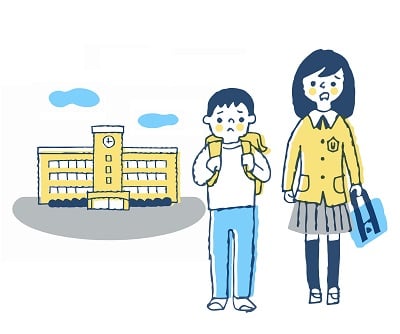7 Tips for Addressing Back-to-School Anxiety
7 Tips for Addressing Back-to-School Anxiety

All good things must come to an end.
The well-known quote is often repeated by many a parent to their children at the end of summer as the fun-in-the-sun activities come to an end and the start of school looms large. While parents may use the quote jokingly or with good intentions, back to school, for many children, and for parents and caregivers, can be anything but funny. For some it can be a source of worry, stress, and anxiety.
As summer comes to a close, whether parents, caregivers, educators or therapists, we all understand that while exciting, the return to school can also be fraught with anxiety. And not just for the children / teens but for parents too. In addition, children who might already be prone to anxiety or suffer from an anxiety disorder will be even more sensitive to the transition.
Child and adolescent therapist Grace Berman, LCSW says it’s really hard to be a kid these days so by extension, it’s really hard to be a parent too. And though it feels like the pandemic is over, there are still repercussions from it, including social anxiety, test fears, and germ phobia. Add to those current trends related to social media and technology use, she explains, and the parenting landscape is challenging to navigate overall.
It’s Still a Thing
Anxiety before school resumes, and even in the first few weeks upon return, continues to affect many of the nation’s children. The pandemic may have exacerbated children’s anxieties but according to Ms. Berman, who now works with The Ross Center for Anxiety & Related Disorders and was for several years a clinician at the Child Mind Institute (CMI), it has always been there.
“Any time we are out of a routine, like going to school, we are essentially ‘avoiding’ that thing,” she told ADAA, “and for most kids there is some amount of discomfort with school whether it’s test taking, socializing, or peer pressure, so it is certainly more comfortable to be on summer break.”
Explaining that continued avoidance and the coming of change can result in increased worries and fears, Ms. Berman says facing the fear is essential. But what about that time between the end of summer and the beginning of school where anxiety feeds and grows?
“Change is hard and going back to school involves some amount of change,” she related, “and the lead up to the change is the hardest.”
7 Tips to Ease the Anxiety
There are ways to make the change a little easier and less stressful for all of us, says Ms. Berman. A lot of it is setting expectations, controlling the things you can control, being transparent and communicating compassionately and honestly, and preparing ahead of time as much as you can. Her 7 tips are:
-
Get back into routines before school starts, including bedtime, morning, meals, and limiting screen time a few weeks before the first day of school.
-
Check in with stress levels – parents and children alike because back to school is stressful for parents and caregivers too.
-
Listen to your children and validate their thoughts and feelings; just saying ‘don’t worry’ will cause more anxiety and possibly deter kids from expressing themselves comfortably.
-
Prepare for what you can – anxiety thrives in uncertainty – so do a test run for school, go to open houses or school community events offered before the beginning of school and even in the first few weeks of the start of school.
-
Create a “cope ahead” plan: think of ways for the child to envision how they can act or react to something that makes them anxious at school and then rehearse the plan for different scenarios.
-
Talk to school mental health professionals; this is particularly important if a child has significant anxiety or a mental health diagnosis. Contact with the school-based mental health team can facilitate creating a response plan, communicating with school staff and outside providers, and dealing with any social, emotional or behavioral issues.
-
Blend back to school with fun activities so transition is less sudden. For example, plan a water or amusement park trip, a shopping or movie outing, camping, or whatever your child has enjoyed over the summer. These can be done on weekends or on days off of school at the beginning.
For more resources click on blogs, webinars, information and additional tips, on anxiety in children.



















